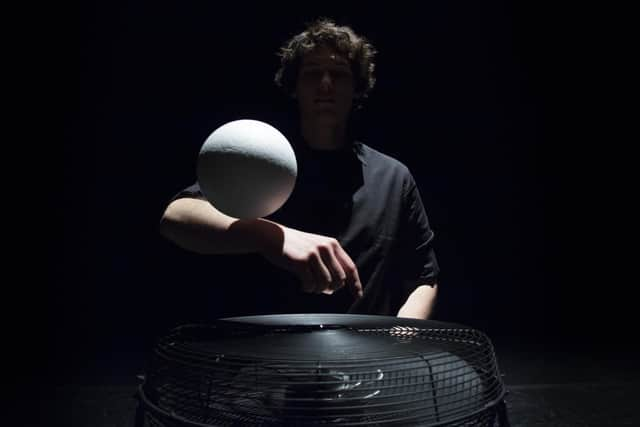Fringe theatre reviews: Moira in Lockdown | Materia | Deaf Ears | Cordelia Butters Investigates | A Scandal from Bohemia


Moira In Lockdown ****
Scottish Storytelling Centre, until 23 August
It’s a remarkable 13 years since Moira Bell first strutted her stuff on a Scottish stage. Queen of the Falkirk schemes, fount of popular wit and wisdom, and never averse to a bit of violence when her nearest and dearest are threatened, Moira is the creation and alter ego of brilliant novelist, playwright and performer Alan Bissett; and lockdown finds her in pensive mood, as she moves into her fifties, and faces a long separation from her friends, family, and three beloved grand-weans.


Moira is never a woman to let the bastards grind her down for long, though, even when the bastard in question is a wee spiky virus from Wuhan; and from the opening scene – set in a chaotic Falkirk supermarket on the eve of the first lockdown, as Moira seeks to grab the last toilet roll – to Moira’s final reflections on her life-defining friendship with her best pal Babs, her lockdown reflections are both hugely and entertaining and strangely moving.
Advertisement
Hide AdThere’s a brief but explosively successful seduction of the Amazon delivery man (“well, it had been a while”), a hilarious online family quiz hosted by Moira and Babs, and – for those who already know Moira – a series of clever and poignant looping back-references to her previous adventures; and always, the sense of a woman with limited life-chances still growing in self-knowledge, describing her life in searingly vivid and humorous style, and always living by her own rules, even if they are not the exactly the same as the rules of middle-class society.
As Moira herself observes, on a scathing post-lockdown visit to Edinburgh, the Fringe is not always the most friendly environment for Scottish working-class culture. It’s a measure of the sheer depth and force of the character Bissett has created, though, that Moira has now carved a definitive place for herself here; glass of voddy in hand, wrapped in her tiger-print dressing-gown, and ready to take on the world. Joyce McMillan
Materia ***
Summerhall, until 14 August
A ghostly polystyrene ball wriggles for freedom between Andrea Salustri’s patient hands. Floating on the airflow from a precisely positioned fan, the ball morphs into a crystal ball, an atom, or even a planet – but only in your mind’s eye. Materia is a precise, monochrome show that feeds the imagination: each scene begins as a careful negotiation between man, plastic, and wind, but pays off like a magic trick. It is uncannily charming to witness the wobbly baby steps taken by a sheet of polystyrene as it stumbles unsteadily between two large fans, Salustri hovering like a protective parent.
The movements grow bolder. Salustri waltzes dramatically with a white square of plastic, and melts another until it looks like a morbid kind of lace. He crumbles fistfuls of styrene with greedy fingers, as if reaching into a crisp packet. Tiny balls shoot into the air like stars, and tumble at our feet like snow. Materia asks for patience from its audience, particularly in the transitions between vignettes, but reaches a crescendo that reveals the every-day material to be something ominously powerful. Humankind’s dance with plastics will define our existence on this planet, and Salustri’s thoughtful object-choreography captures this tension with creativity and grace. Katie Hawthorne
Deaf Ears ***
Pleasance Courtyard, Until 15 August
Chicago-born Joe Friedman grew up in the 1950s, the hearing child of a deaf couple who were – due to the attitudes they experienced a generation earlier – ashamed and resentful of their deafness. As a toddler, young Joe learned to save his tears for when his parents could see him and, by the age of eight, was in charge of the family telephone. But the distance between them only grew.
Friedman, a psychotherapist who writes children’s books and discovered stand-up comedy in his fifties, has created a piece of storytelling rather than theatre. He tells more often than he shows, in an even, reassuring tone, explaining his pain but rarely inviting us to share it dramatically.
Advertisement
Hide AdHe spends more time on anecdotes – such as the amusing interlude about an acid-fuelled encounter with a cop – than on the knotty story at the heart of this show: parents who struggled to connect with a child and how this in turn impacted his life.
However, while he could afford to flesh out these aspects of his story some more, it’s warm-hearted and well-intentioned and reminds us that our ability truly to hear other people has very little to do with the mechanics of our ears. Susan Mansfield
Cordelia Butters Investigates **
Laughing Horse @ The Counting House, until 18 August
Advertisement
Hide AdSome impressive technical aspects, two confident performances and one remarkably convincing American accent illuminate this interesting, if not entirely successful, Pay What You Can show. Cordelia (Sarah Kempton) has adopted the accent for her true crime podcast which she's created to win back her estranged husband. Dressed in a canary yellow jumpsuit (every detective needs an iconic look) she investigates an unsolved murder with the help of her producer (Danielle Downey) who also assumes other roles. The script favours the convoluted plot over laughs but Kempton and Downey's interactions are enjoyable and there's more than enough evidence here to suggest they'll go on to bigger and better things. Rory Ford
A Scandal From Bohemia *
C ARTS | C venues | C cubed, until 14 August
Even Conan Doyle completists can give this follow-up to the very first Sherlock Holmes short story a miss. Taking place 30 years after Holmes' first encounter with Irene Adler, it's a clunky pastiche scuppered by indifferent writing and flat staging - the cast sometimes face the audience almost shoulder-to-shoulder as if they're standing in a police line-up. The performances range from adequate to deeply shaky and the only suspense comes from the long pauses as actors struggle to recall their next line. The costumes are frequently the most convincing things on stage. Rory Ford